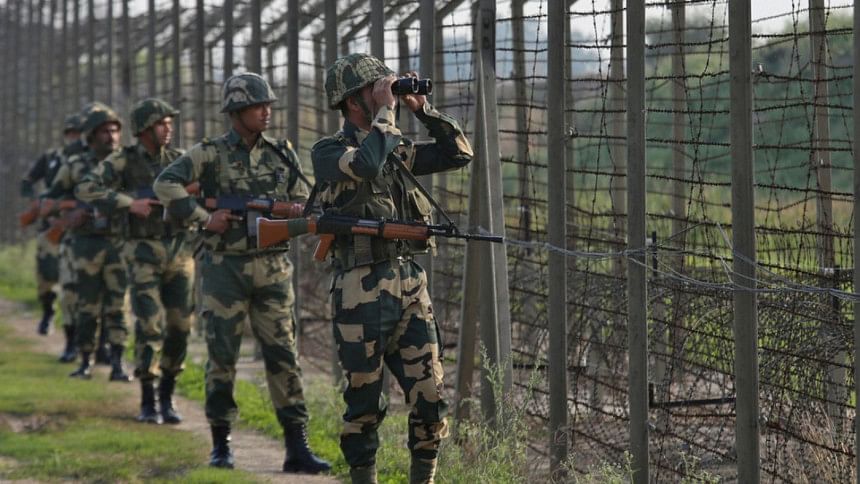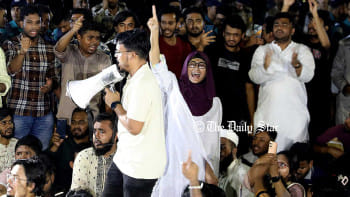Indo-Pak flare-up has dangerous portents

The sudden eruption of a combustible situation between India and Pakistan has quite understandably concentrated anxious attention from everywhere in the globe. There are a raft of good reasons why the crisis that has emerged could spiral out of control into something horrific.
Pakistan's army establishment has a history of committing reckless acts without thinking through the consequences. The country's nuclear button is controlled by the army, and politicians are a marginal factor, or perhaps no factor at all. That is precisely the thing to worry about.
In the wake of a deadly car bomb attack on a military convoy that killed 40 Indian para-military police in Pulwama district of Kashmir on February 14, and a subsequent attack that killed a major and four soldiers, India took retaliatory action. With an eye to the coming general elections and public outrage that is running high in India, Prime Minister Narendra Modi reacted with expected severity. A bombing raid in Balakot, 50 miles into the Pakistani controlled Kashmir on a Jaish e-Mohammad training camp killed 300 terrorists (India claimed but Pakistan rejected). The next day on February 27, there were reports of a Pakistani response, the downing of two Indian jets.
Immediately after the February 14 incident India had revoked trade privileges for Pakistan and protection for four Kashmiri separatist leaders. In September 2016, after an attack on a military base in Kashmir which left 19 soldiers dead, India carried out a "surgical' raid in Pakistani held Kashmir. Mr Modi came to power having cultivated an image of a strong, go-getter leader. He sought to establish a reputation that his government will not take supinely Pakistani devices to target Indian security forces by using surrogate terror groups.
In 1998 after India and Pakistan both acquired nuclear capability, President Bill Clinton termed the ceasefire line between India and Pakistan in Kashmir as "the most dangerous place in the world". Clinton's prescience has been vindicated by later events.
The voices of caution coming from various quarters and the counsel of restraint to both sides demonstrate how seriously the imbroglio is being viewed internationally. The totally irreconcilable positions of India and Pakistan on the Kashmir dispute and the three wars the two countries fought since their emergence in 1947 constitute the fraught backdrop of their implacable antagonism. After both sides acquired nuclear capability, they have avoided a full-scale war. However, in 1999, during the Kargil war, when Indian forces were poised to decimate Pakistani troops which had crossed the border and captured mountain peaks in Kargil area, Pakistan was preparing for a nuclear response (presumably of a tactical nature). A frightening spectre developed of a war that could kill millions and cause other unutterable damage. It was thanks to the intervention of Mr Clinton that Pakistan was dissuaded from this incendiary step.
The dramatically different domestic political dynamics in the two countries explains the contrasting manner in which they perceive and deal with one another. India is a country which has a long unbroken history of democracy since its independence in 1947. In a country in which democratic culture is deeply rooted and long entrenched, with civilian leadership in control of policies, there is a natural disinclination towards warfare. Democratic governments tend to be more responsive to public sentiment, and common men do not like war and what it entails. In Pakistan, where democracy was subverted by the armed forces early on in its embryonic days and the country's tryst with democracy has been of no more than of a stumbling and tentative nature, the army establishment wields ultimate power. This is also reflected in the extent of its influence in the economy and business. A relationship of peace, stability and cooperation with India is never suitable or congenial for the army establishment.
In 1971, when the Pakistan army establishment unleashed its brutality in Bangladesh and inanely sought to solve a political problem by terrorising and savaging the people, they did not have the sensibility to realise how self-defeating the step was and that they were setting in motion a process that would split their country asunder.
Stirring up trouble with India from time to time has been a handy device for the Pakistan army to silence critical public sentiment toward them and keep the political forces under their sway. A normal relationship between India and Pakistan cannot happen as long Pakistan's internal situation remains as it is.
The losses in a nuclear confrontation would be sustained disproportionately by Pakistan, and any notion that Pakistan enjoys an impunity because of its nuclear arms is an illusion. There is a consensus among military and strategic experts that India enjoys a substantial superiority over Pakistan in terms of not only the size of its armed forces, but its military technology. In its nuclear arsenal for example, India not only has more destructive bombs but longer-range missile capability. Pakistan's navy lacks nuclear strike capacity. On the other hand, India has acquired a triad of air, land and sea-based nuclear platforms after it deployed its nuclear submarine, Arihant. If Pakistan, in a scenario where it is losing a conventional war, uses nuclear weapons tactically as a deterrent, India would most likely retaliate with a full-scale nuclear assault.
It is fairly obvious that India also commands a clear advantage in a diplomatic context. Pakistan has recently become visibly isolated. Even its most trusted friend China stopped short of using its veto, as a permanent member of UNSC, when, on February 22, the Council passed a strongly worded resolution condemning Jaish-e-Mohammad. The US has given its support to India. The major EU powers Britain, Germany and France have tilted towards India in this present crisis.
Despite short-term domestic political calculations that are driving the brinkmanship, both countries should be encouraged to better recognise the risks and ease tensions. They need to initiate a constructive process of dialogue or be receptive to any initiative from nations who are able to mediate.
India will stand to benefit by recognising that the people of Kashmir have a grievance which needs to be addressed. An inclusive policy that seeks to win the hearts and minds of Muslims in Indian-held Kashmir would deny elements in Pakistan the ability to exploit their disaffection. It would make it considerably harder to recruit insurgents.
The road ahead is strewn with difficulties and long-entrenched distrust, but for both countries to continue on the present path could have calamitous consequences.
Ziaus Shams Chowdhury is a former ambassador.

 For all latest news, follow The Daily Star's Google News channel.
For all latest news, follow The Daily Star's Google News channel. 



Comments